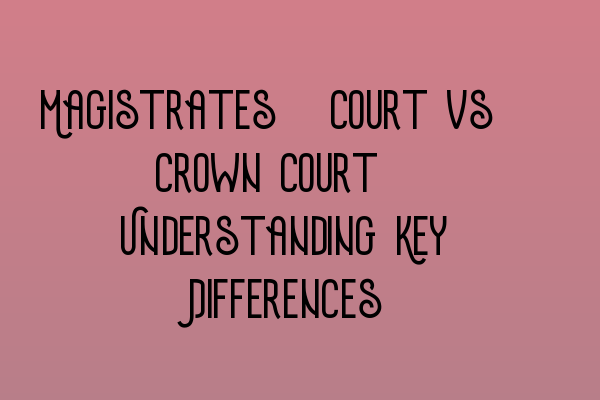Magistrates’ Court vs. Crown Court: Understanding Key Differences
When it comes to criminal law in the UK, there are two main types of courts that handle cases: Magistrates’ Court and Crown Court. Each court has its own specific jurisdiction, procedures, and sentencing powers. In this article, we will explore the key differences between Magistrates’ Court and Crown Court to help you understand how they function.
Magistrates’ Court
Magistrates’ Court is the lower court in the UK’s criminal justice system. It primarily deals with less serious criminal offenses, such as traffic offenses, minor assaults, theft, and public order offenses. Cases in Magistrates’ Court are usually heard by a panel of three magistrates or a district judge.
The procedures in Magistrates’ Court are relatively simple and informal compared to Crown Court. The court operates with more speed and efficiency, aiming to resolve cases swiftly. This means that trials in Magistrates’ Court are usually shorter and less complex.
One of the key features of Magistrates’ Court is that it has limited sentencing powers. The maximum punishment that can be imposed in Magistrates’ Court is usually up to six months imprisonment or a fine of up to £5,000, depending on the offense. More serious cases may be referred to Crown Court for sentencing.
If you are facing a trial in Magistrates’ Court, it is important to seek legal representation to ensure a fair trial. Professional solicitors with expertise in criminal law, like the team at SQE Criminal Law & Practice Law UK, can provide you with the necessary guidance and support throughout the legal process.
Crown Court
Crown Court, on the other hand, handles more serious criminal cases that require a jury trial and have greater sentencing powers. These cases include serious assaults, drug offenses, sexual offenses, and murder. Unlike Magistrates’ Court, Crown Court does not have the power to deal with minor offenses.
In Crown Court, cases are heard by a judge and a jury of 12 members. The judge is responsible for ensuring that the trial is conducted fairly and according to the law. The jury’s role is to consider the evidence presented in court and reach a verdict based on the facts of the case.
Crown Court procedures are more formal and structured compared to Magistrates’ Court. Trials in Crown Court tend to be longer and more complex, as the seriousness of the offenses requires a more thorough examination of evidence and legal arguments.
One significant difference between Magistrates’ Court and Crown Court is the sentencing powers. Crown Court has the authority to impose significantly higher sentences, including life imprisonment for the most serious offenses. The judge determines the appropriate punishment based on the severity of the crime and any aggravating or mitigating factors.
If you are due to appear in Crown Court, it is crucial to have proper legal representation. Experienced solicitors who specialize in criminal law, such as those at SQE Criminal Law & Practice Law UK, can provide you with the expert advice needed to navigate the complexities of the Crown Court process.
Conclusion
In summary, Magistrates’ Court and Crown Court play distinct roles in the UK’s criminal justice system. Magistrates’ Court handles less serious offenses and has limited sentencing powers, while Crown Court deals with more serious crimes and has the authority to impose higher sentences. Understanding the differences between these two courts is essential for anyone involved in criminal proceedings.
If you require additional information or legal assistance regarding criminal law in the UK, SQE Criminal Law & Practice Law UK can provide you with the expert advice and representation you need. Visit our related articles for more valuable resources:
- SQE 1 Practice Exam Questions
- SQE 1 Practice Mocks FLK1 FLK2
- SQE 2 Preparation Courses
- SQE 1 Preparation Courses
- SRA SQE Exam Dates
